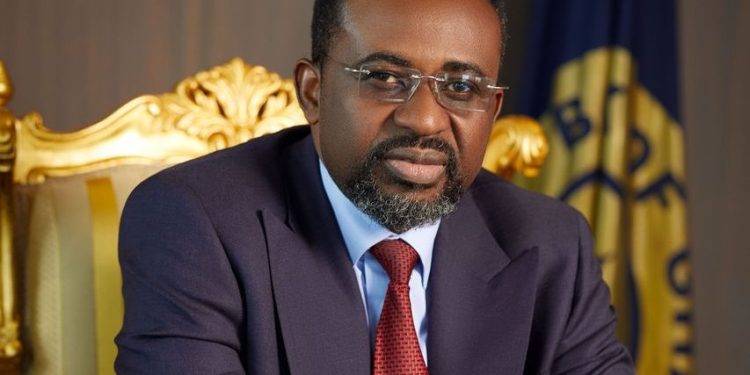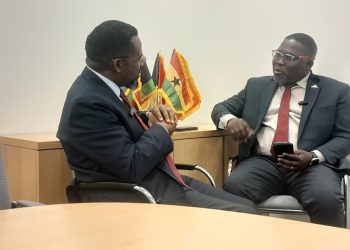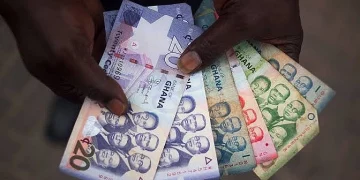Governor Dr Asiama Projects Macroeconomic Stability Amid IMF Programme Wind-down
- Exclusive: In conversation with NorvanReports, Dr. Johnson Asiama outlines macroeconomic recovery strategy, commits to monetary discipline and signals easing inflation
Ghana is poised to restore macroeconomic stability and exit its IMF programme on a strong footing by mid-2026, according to Dr. Johnson Asiama, Governor of the Bank of Ghana, in an exclusive interview with NorvanReports on the sidelines of the IMF and World Bank Spring Meetings in Washington D.C.
Dr. Asiama said the central bank is “building on familiar ground” and reaffirmed that Ghana is “on the right path” to full macroeconomic recovery. He pointed to a rebound in growth, a strengthening external position, and an anticipated easing in inflation as signs that reforms are beginning to bear fruit.
“The IMF programme is set to end by the middle of next year. The recently concluded staff-level agreement is proof that we are on course to meet our goals,” Dr. Asiama told NorvanReports. “Already, growth is bouncing back, last year came in at about 5.7%. The external sector is very strong, with balance of payments surpluses.”
His remarks come at a critical juncture in Ghana’s reform journey. After enduring one of the worst economic crises in its recent history, marked by soaring inflation, a currency depreciation of over 50% in 2022, and an unsustainable debt burden, Ghana entered a $3 billion IMF Extended Credit Facility programme. The success of this programme now hangs on the country’s ability to sustain fiscal consolidation while delivering social and investment spending.
Resilience with Risks
Ghana’s recent economic data gives room for cautious optimism. The cedi, once under immense pressure, has shown relative stability in early 2025. Foreign exchange reserves now cover over four months of imports, and gold production, the country’s top export, continues to rise.
Yet, inflation remains stubbornly elevated. Dr. Asiama acknowledged the challenge but signalled a turning point. “Once the cedi begins to appreciate, the non-food inflation component becomes controllable,” he said. “As government addresses the food inflation side through fiscal policy, we expect inflation to trend down gradually.”
This dual-track inflation strategy, which includes combining currency stability with food price containment, forms a key plank of the central bank’s medium-term outlook.
The Governor also suggested that once inflation is on a clear downward path, interest rates will follow. “With inflation trending down, we expect interest rates and lending costs to come down, something that will matter greatly to the private sector.”
Path to Policy Credibility
Dr. Asiama’s tenure represents both continuity and credibility. A former Deputy Governor under whom many of today’s reforms began, he has returned at a time when Ghana needs to reinforce confidence in its institutions. His appointment in January 2025 followed months of political and economic transition under the new administration of President John Dramani Mahama.
For international partners, many of whom are watching Ghana as a bellwether for debt restructuring outcomes in Africa, the central bank’s posture will be critical. The Governor’s comments are welcomed by investors seeking predictability in monetary policy and signals of continued fiscal prudence.
“There’s every hope that we’ll be able to complete the Fund programme, achieve its objectives, and create a solid platform for growth going forward,” Dr. Asiama affirmed.
As Ghana heads into the final leg of the IMF program, the central bank’s challenge will be balancing inflation management with real-sector recovery— a task complicated by persistent global uncertainties, rising geopolitical tensions, and volatility in commodity markets.
The Road Ahead
Ghana’s post-program strategy remains in the spotlight. While the central bank focuses on price stability, structural bottlenecks, particularly in agriculture, energy, and infrastructure financing, could threaten the recovery’s durability. Analysts argue that monetary stability must be paired with institutional reforms and productivity gains.
But for now, the central bank appears to be playing its part.
Dr. Asiama’s tone, both cautious and confident, reflects a desire to manage expectations without undermining ambition. “We are optimistic,” he said. “And that optimism is grounded in evidence.”









